110+ Conjunctive Adverb Examples
Conjunctive adverbs are essential tools in writing that help to establish logical connections between ideas, enhancing sentence coherence and flow. By providing transitions, conjunctive adverbs enable writers to connect sentences, paragraphs, and even entire sections of text smoothly. This article explores the definition of conjunctive adverbs, offers a step-by-step guide on how to use them effectively, answers frequently asked questions, and concludes with a creative reflection on their significance in diverse writing contexts.
What is a Conjunctive Adverb?
A conjunctive adverb connects independent clauses in a sentence, providing transitions and indicating relationships like cause, effect, contrast, or sequence. Examples include “however,” “therefore,” “moreover,” and “consequently.” They are typically followed by a comma when used at the beginning of a second clause.
Conjunctive Adverb Rules
Conjunctive adverbs are words that connect two independent clauses, showing the relationship between them. They often provide transitions, comparisons, contrasts, or sequences. Here are the rules for using conjunctive adverbs:
- Use a Semicolon Before the Conjunctive Adverb:
- Place a Comma After the Conjunctive Adverb:
- When a conjunctive adverb appears at the beginning of the second clause, it should be followed by a comma.
- Example: “He studied hard; therefore, he passed the exam.”
- Conjunctive Adverbs within a Clause:
- If a conjunctive adverb appears in the middle of a clause, it is usually surrounded by commas.
- Example: “She is, nevertheless, determined to succeed.”
- Beginning a Sentence with a Conjunctive Adverb:
- A conjunctive adverb can start a sentence to show the relationship to the previous sentence, and it should be followed by a comma.
- Example: “She didn’t enjoy the movie. Instead, she found it quite boring.”
- Common Conjunctive Adverbs:
- Here are some common conjunctive adverbs: however, therefore, moreover, consequently, nevertheless, furthermore, meanwhile, thus, accordingly, instead, likewise, otherwise, similarly, subsequently.
- Sentence Structure Examples:
- Contrast: “He is very talented; however, he lacks discipline.”
- Result: “The weather was terrible; consequently, the event was postponed.”
- Addition: “She is an excellent student; moreover, she volunteers regularly.”
- Time: “The meeting was long; meanwhile, the team continued working.”
- Avoid Run-on Sentences:
- Ensure that both parts of the sentence can stand alone as independent clauses.
- Example: Incorrect: “She loves to travel, however, she hates flying.”
- Example: Correct: “She loves to travel; however, she hates flying.”
Common Conjunctive Adverbs and Their Functions
| Conjunctive Adverb | Function | Example |
|---|---|---|
| However | Contrast | “She wanted to go; however, it was too late.” |
| Therefore | Result | “He was late; therefore, he missed the bus.” |
| Moreover | Addition | “She is kind; moreover, she is intelligent.” |
| Consequently | Result | “It rained all night; consequently, the game was canceled.” |
| Nevertheless | Contrast | “He was tired; nevertheless, he finished his work.” |
| Furthermore | Addition | “She is a great leader; furthermore, she inspires others.” |
| Meanwhile | Time | “He was studying; meanwhile, she was watching TV.” |
| Thus | Result | “He didn’t study; thus, he failed the exam.” |
| Accordingly | Result | “The project was a success; accordingly, they celebrated.” |
| Instead | Contrast/Alternative | “She didn’t go out; instead, she stayed home.” |
| Likewise | Comparison | “He is tall; likewise, his brother is very tall.” |
| Otherwise | Condition | “We need to hurry; otherwise, we’ll be late.” |
| Similarly | Comparison | “She loves music; similarly, her friend is a musician.” |
| Subsequently | Sequence/Time | “He won the match; subsequently, he became famous.” |
| Conversely | Contrast | “He is very active; conversely, his sister is quite lazy.” |
| Hence | Result | “She was ill; hence, she couldn’t attend the meeting.” |
| Nonetheless | Contrast | “It was raining; nonetheless, they went for a hike.” |
| Besides | Addition | “He is a good player; besides, he is a great coach.” |
| Otherwise | Condition | “Complete the form; otherwise, it won’t be processed.” |
Examples of Conjunctive Adverb:
Conjunctive Adverb list
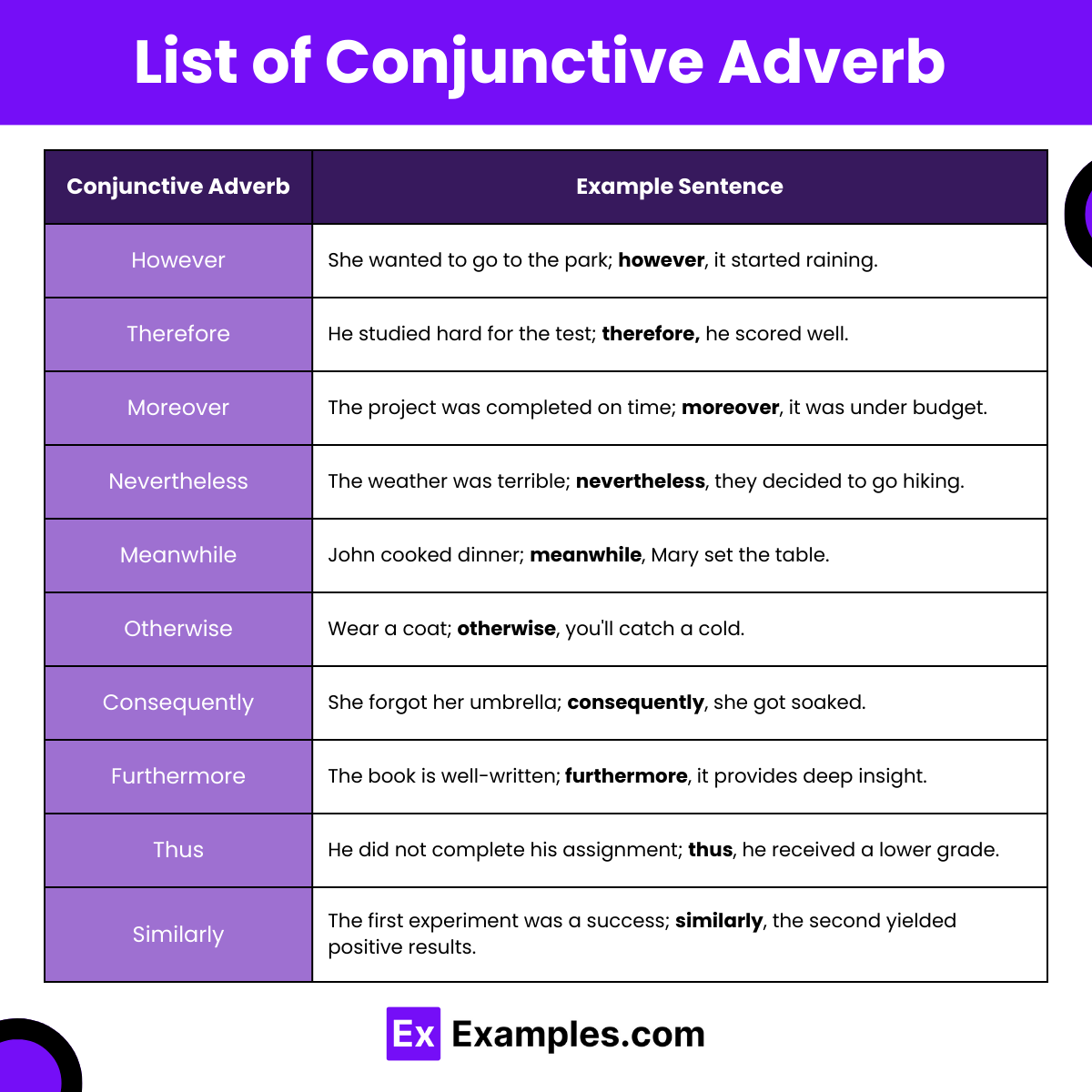
| Conjunctive Adverb | Example Sentence |
|---|---|
| Moreover | She is a talented singer; moreover, she plays the piano well. |
| Furthermore | The project is risky; furthermore, it is expensive. |
| Additionally | He enjoys painting; additionally, he loves sculpture. |
| Besides | I can’t go; besides, I don’t want to. |
| Also | She speaks French; also, she understands Spanish. |
| However | I wanted to go; however, it was too late. |
| Nevertheless | It was raining; nevertheless, we went for a walk. |
| On the other hand | He is strict; on the other hand, he is fair. |
| Conversely | She didn’t like the movie; conversely, he loved it. |
| Yet | The task was difficult; yet, they completed it on time. |
| Therefore | It was cold; therefore, we stayed inside. |
| Thus | He studied hard; thus, he passed the exam. |
| Consequently | She missed the bus; consequently, she was late. |
| Hence | It rained heavily; hence, the match was postponed. |
| Accordingly | They were warned; accordingly, they took precautions. |
| Then | Finish your work; then, you can play. |
| Next | We went to the park; next, we visited the museum. |
| Subsequently | She graduated; subsequently, she started her career. |
| Finally | We waited long; finally, the train arrived. |
| Meanwhile | He was cooking; meanwhile, she set the table. |
| Indeed | The book is fascinating; indeed, it’s a masterpiece. |
| Certainly | She will certainly attend; she never misses a meeting. |
| In fact | He is a great athlete; in fact, he won several medals. |
| Undoubtedly | It is undoubtedly the best solution. |
| Clearly | She was clearly upset about the news. |
| Similarly | The two paintings are similarly styled. |
| Likewise | He was late; likewise, she missed the bus. |
| In the same way | They responded in the same way to the news. |
| Comparatively | This model is comparatively cheaper. |
| Equally | He is equally talented in music and sports. |
| Otherwise | You must hurry; otherwise, you’ll miss the flight. |
| If not | Bring your umbrella; if not, you’ll get wet. |
| Provided that | You can go out, provided that you finish your homework. |
| Unless | You can’t succeed unless you try. |
| In that case | The meeting is canceled; in that case, I’ll work from home. |
| Nonetheless | It was expensive; nonetheless, it was worth it. |
| Even so | The task is hard; even so, they are determined. |
| Despite this | She was tired; despite this, she continued working. |
| Still | He was warned; still, he took the risk. |
| Regardless | They proceeded, regardless of the danger. |
| For example | Many fruits are healthy; for example, apples and oranges. |
| For instance | There are many options; for instance, you could try A or B. |
| Namely | Three countries, namely, Japan, China, and Korea, were visited. |
| Specifically | He is interested in sports, specifically, soccer. |
| In particular | She loves desserts, in particular, chocolate cake. |
| In conclusion | In conclusion, we achieved all our goals. |
| In summary | In summary, the event was a success. |
| To sum up | To sum up, the project was a triumph. |
| Overall | Overall, the experiment was successful. |
| Meanwhile | She was reading; meanwhile, he was writing. |
Conjunctive Adverb Examples Sentences
- Moreover, she is a talented singer; moreover, she plays the piano well.
- Furthermore, the project is risky; furthermore, it is expensive.
- Additionally, he enjoys painting; additionally, he loves sculpture.
- Besides, I can’t go; besides, I don’t want to.
- Also, she speaks French; also, she understands Spanish.
- However, I wanted to go; however, it was too late.
- Nevertheless, it was raining; nevertheless, we went for a walk.
- On the other hand, he is strict; on the other hand, he is fair.
- Conversely, she didn’t like the movie; conversely, he loved it.
- Yet, the task was difficult; yet, they completed it on time.
- Therefore, it was cold; therefore, we stayed inside.
- Thus, he studied hard; thus, he passed the exam.
- Consequently, she missed the bus; consequently, she was late.
- Hence, it rained heavily; hence, the match was postponed.
- Accordingly, they were warned; accordingly, they took precautions.
- Then, finish your work; then, you can play.
- Next, we went to the park; next, we visited the museum.
- Subsequently, she graduated; subsequently, she started her career.
- Finally, we waited long; finally, the train arrived.
- Meanwhile, he was cooking; meanwhile, she set the table.
- Indeed, the book is fascinating; indeed, it’s a masterpiece.
- Certainly, she will certainly attend; she never misses a meeting.
- In fact, he is a great athlete; in fact, he won several medals.
- Undoubtedly, it is undoubtedly the best solution.
- Clearly, she was clearly upset about the news.
- Similarly, the two paintings are similarly styled.
- Likewise, he was late; likewise, she missed the bus.
- In the same way, they responded in the same way to the news.
- Comparatively, this model is comparatively cheaper.
- Equally, he is equally talented in music and sports.
Conjunctive Adverb Examples: Moreover
Conjunctive adverbs are essential in writing as they help to connect ideas and provide smooth transitions between sentences and paragraphs. One commonly used conjunctive adverb is “moreover.” It adds additional information to support the previous statement, emphasizing its significance. Below are some examples and explanations of how to use “moreover” effectively.
1. Enhancing Statements
- Example: The new policy will benefit the employees. Moreover, it will increase overall productivity.
- The new policy will benefit the employees. Moreover, it will increase overall productivity.
2. Adding Similar Ideas
- Example: The book was insightful. Moreover, the author’s writing style was captivating.
- The book was insightful. Moreover, the author’s writing style was captivating.
3. Supporting Arguments
- Example: Exercise improves physical health. Moreover, it boosts mental well-being.
- Exercise improves physical health. Moreover, it boosts mental well-being.
4. Providing Additional Information
- Example: The conference was well-organized. Moreover, the speakers were highly knowledgeable.
- The conference was well-organized. Moreover, the speakers were highly knowledgeable.
5. Emphasizing Multiple Points
- Example: The project was completed on time. Moreover, it was under budget.
- The project was completed on time. Moreover, it was under budget.
6. Highlighting Further Benefits
- Example: Learning a new language enhances cognitive skills. Moreover, it opens up cultural opportunities.
- Learning a new language enhances cognitive skills. Moreover, it opens up cultural opportunities.
7. Strengthening a Position
- Example: Renewable energy sources are sustainable. Moreover, they reduce dependence on fossil fuels.
- Renewable energy sources are sustainable. Moreover, they reduce dependence on fossil fuels.
8. Expanding on a Topic
- Example: The film received critical acclaim. Moreover, it was a box office success.
- The film received critical acclaim. Moreover, it was a box office success.
9. Linking Related Concepts
- Example: She is an excellent teacher. Moreover, her dedication to her students is remarkable.
- She is an excellent teacher. Moreover, her dedication to her students is remarkable.
10. Adding New Insights
- Example: The study reveals significant data. Moreover, it provides a new perspective on the issue.
- The study reveals significant data. Moreover, it provides a new perspective on the issue.
Conjunctive Adverb Examples: Meanwhile
Conjunctive adverbs are essential in writing as they help to connect ideas and provide smooth transitions between sentences and paragraphs. One commonly used conjunctive adverb is “meanwhile.” It indicates that two events are happening at the same time, providing a sense of simultaneous action or parallel occurrences. Below are some examples and explanations of how to use “meanwhile” effectively.
1. Concurrent Events
- Example: John was cooking dinner. Meanwhile, Mary was setting the table.
- John was cooking dinner. Meanwhile, Mary was setting the table.
2. Simultaneous Actions
- Example: The children were playing outside. Meanwhile, their parents were discussing vacation plans.
- The children were playing outside. Meanwhile, their parents were discussing vacation plans.
3. Different Locations
- Example: The team was practicing on the field. Meanwhile, the coach was in a meeting.
- The team was practicing on the field. Meanwhile, the coach was in a meeting.
4. Parallel Situations
- Example: The store was closing for the day. Meanwhile, the online shop remained open.
- The store was closing for the day. Meanwhile, the online shop remained open.
5. Ongoing Processes
- Example: The software was being installed. Meanwhile, the users were reading the manual.
- The software was being installed. Meanwhile, the users were reading the manual.
6. Different Activities
- Example: The guests were arriving. Meanwhile, the host was preparing refreshments.
- The guests were arriving. Meanwhile, the host was preparing refreshments.
7. Related Events
- Example: The presentation was starting. Meanwhile, the audience was settling in their seats.
- The presentation was starting. Meanwhile, the audience was settling in their seats.
8. Sequential Timing
- Example: The train departed at noon. Meanwhile, passengers were boarding the next one.
- The train departed at noon. Meanwhile, passengers were boarding the next one.
9. Multiple Focuses
- Example: The actor was rehearsing his lines. Meanwhile, the director was arranging the set.
- The actor was rehearsing his lines. Meanwhile, the director was arranging the set.
10. Varied Tasks
- Example: The chef was preparing the main course. Meanwhile, the sous chef was making the dessert.
- The chef was preparing the main course. Meanwhile, the sous chef was making the dessert.
Conjunctive Adverb Examples: Nevertheless
Conjunctive adverbs are essential in writing as they help to connect ideas and provide smooth transitions between sentences and paragraphs. One commonly used conjunctive adverb is “nevertheless.” It introduces a contrast or unexpected continuation, often emphasizing that despite the previous statement, something else is still true. Below are some examples and explanations of how to use “nevertheless” effectively.
1. Contrasting Statements
- Example: The weather was terrible. Nevertheless, they decided to go hiking.
- The weather was terrible. Nevertheless, they decided to go hiking.
2. Unexpected Outcomes
- Example: He was inexperienced. Nevertheless, he managed to complete the project successfully.
- He was inexperienced. Nevertheless, he managed to complete the project successfully.
3. Overcoming Obstacles
- Example: She was tired. Nevertheless, she continued to work on her assignment.
- She was tired. Nevertheless, she continued to work on her assignment.
4. Despite Difficulties
- Example: The exam was challenging. Nevertheless, she scored the highest marks.
- The exam was challenging. Nevertheless, she scored the highest marks.
5. Persistence in Adversity
- Example: The team faced many setbacks. Nevertheless, they won the championship.
- The team faced many setbacks. Nevertheless, they won the championship.
6. Unexpected Persistence
- Example: He was not feeling well. Nevertheless, he attended the meeting.
- He was not feeling well. Nevertheless, he attended the meeting.
7. Defying Expectations
- Example: The book was lengthy. Nevertheless, it was an enjoyable read.
- The book was lengthy. Nevertheless, it was an enjoyable read.
8. Continuing Efforts
- Example: The task was difficult. Nevertheless, she refused to give up.
- The task was difficult. Nevertheless, she refused to give up.
9. Unexpected Success
- Example: They had limited resources. Nevertheless, the event was a success.
- They had limited resources. Nevertheless, the event was a success.
10. Maintaining Focus
- Example: He encountered numerous distractions. Nevertheless, he completed his work on time.
- He encountered numerous distractions. Nevertheless, he completed his work on time.
Conjunctive Adverb Examples: Otherwise
Conjunctive adverbs are essential in writing as they help to connect ideas and provide smooth transitions between sentences and paragraphs. One commonly used conjunctive adverb is “otherwise.” It introduces an alternative or opposite situation, emphasizing what would happen under different circumstances. Below are some examples and explanations of how to use “otherwise” effectively.
1. Conditional Outcomes
- Example: You need to submit your application by Friday. Otherwise, you won’t be considered for the job.
- You need to submit your application by Friday. Otherwise, you won’t be considered for the job.
2. Alternative Actions
- Example: Wear a coat. Otherwise, you’ll catch a cold.
- Wear a coat. Otherwise, you’ll catch a cold.
3. Different Results
- Example: Follow the instructions carefully. Otherwise, the project might fail.
- Follow the instructions carefully. Otherwise, the project might fail.
4. Possible Consequences
- Example: Study for the exam. Otherwise, you might not pass.
- Study for the exam. Otherwise, you might not pass.
5. Avoiding Problems
- Example: Make a reservation in advance. Otherwise, the restaurant might be fully booked.
- Make a reservation in advance. Otherwise, the restaurant might be fully booked.
6. Ensuring Success
- Example: Save your work frequently. Otherwise, you might lose important data.
- Save your work frequently. Otherwise, you might lose important data.
7. Preventing Issues
- Example: Check your car’s oil level regularly. Otherwise, the engine could get damaged.
- Check your car’s oil level regularly. Otherwise, the engine could get damaged.
8. Necessary Precautions
- Example: Lock your doors at night. Otherwise, someone might break in.
- Lock your doors at night. Otherwise, someone might break in.
9. Avoiding Misunderstandings
- Example: Be clear in your communication. Otherwise, people might misunderstand you.
- Be clear in your communication. Otherwise, people might misunderstand you.
10. Ensuring Compliance
- Example: Follow the safety guidelines. Otherwise, you could be fined.
- Follow the safety guidelines. Otherwise, you could be fined.
More Conjunctive Adverb Examples & Samples:
1. Conjunctive Adverb Example
2. Sample Conjunctive Adverb
3. Common Conjunctive Adverb
4. Conjunctive Adverb in Simple Compound Sentences
5. Conjunctive Adverb Template
6. Basic Conjunctive Adverb
Semicolon with Conjunctive Adverb
Conjunctive adverbs help connect two independent clause, providing smooth transitions between ideas. When using conjunctive adverbs to link independent clauses, a semicolon is placed before the conjunctive adverb, and a comma follows it. Below are examples of how to use semicolons with various conjunctive adverbs, including “moreover,” “meanwhile,” “nevertheless,” and “otherwise.”
Conjunctive Adverb: Moreover
1. Enhancing Statements
- Example: The new policy will benefit the employees; moreover, it will increase overall productivity.
2. Adding Similar Ideas
- Example: The book was insightful; moreover, the author’s writing style was captivating.
Conjunctive Adverb: Meanwhile
1. Concurrent Events
- Example: John was cooking dinner; meanwhile, Mary was setting the table.
2. Simultaneous Actions
- Example: The children were playing outside; meanwhile, their parents were discussing vacation plans.
Conjunctive Adverb: Nevertheless
1. Contrasting Statements
- Example: The weather was terrible; nevertheless, they decided to go hiking.
2. Unexpected Outcomes
- Example: He was inexperienced; nevertheless, he managed to complete the project successfully.
Conjunctive Adverb: Otherwise
1. Conditional Outcomes
- Example: You need to submit your application by Friday; otherwise, you won’t be considered for the job.
2. Alternative Actions
- Example: Wear a coat; otherwise, you’ll catch a cold.
Conjunctive Adverbs vs. Subordinating Conjunctions
Conjunctive adverbs and subordinating conjunctions are both used to connect clauses, but they function differently in a sentence. Below is a table that highlights the key differences between conjunctive adverbs and subordinating conjunctions, providing clear and easy-to-understand comparisons.
| Feature | Conjunctive Adverbs | Subordinating Conjunctions |
|---|---|---|
| Function | Connect independent clauses | Connect independent and dependent clauses |
| Examples | Moreover, however, therefore, nevertheless, meanwhile | Because, although, since, if, when |
| Punctuation | Semicolon before and comma after when between clauses | No special punctuation when introducing a dependent clause |
| Clause Independence | Both clauses can stand alone as sentences | Dependent clause cannot stand alone |
| Placement in Sentence | Typically at the beginning of the second clause | At the beginning of the dependent clause |
| Example Sentences | The project was challenging; however, we completed it. | Although the project was challenging, we completed it. |
| Indicating Transition | Shows contrast, addition, cause-effect, or sequence | Indicates cause, condition, contrast, time, or reason |
How to use Conjunctive Adverbs
To harness the power of conjunctive adverbs in your writing, follow this step-by-step guide to ensure seamless transitions and improved coherence within your sentences and paragraphs.
Step 1: Identify the need for coherence:
Before incorporating conjunctive adverbs, assess your writing for areas where ideas may appear disjointed or where smoother transitions could enhance overall coherence. Look for instances where the logical connection between clauses or sentences could be strengthened.
Step 2: Choose appropriate conjunctive adverbs:
Select a conjunctive adverb that best fits the desired logical relationship between clauses or sentences. Common examples include “however,” “thus,” “therefore,” “in addition,” and “consequently.” Each conjunctive adverb serves a specific purpose in signaling the connection you wish to establish.
Step 3: Place the conjunctive adverb correctly:
Position the conjunctive adverb between two independent clauses, using a comma to separate them. Ensure that the adverb seamlessly integrates into the sentence structure, maintaining clarity and coherence.
What is a conjunctive adverb?
A conjunctive adverb connects two independent clauses, showing relationships like addition, contrast, cause-effect, or sequence. Examples include “however,” “therefore,” and “moreover.”
How do you punctuate a conjunctive adverb?
Place a semicolon before the conjunctive adverb and a comma after it when connecting two independent clauses.
Can you start a sentence with a conjunctive adverb?
Yes, you can start a sentence with a conjunctive adverb. Use a comma after the conjunctive adverb when it starts a sentence.
What are some common conjunctive adverbs?
Common conjunctive adverbs include “however,” “therefore,” “moreover,” “nevertheless,” “meanwhile,” “consequently,” “thus,” “furthermore,” “instead,” and “otherwise.”
How do conjunctive adverbs differ from subordinating conjunctions?
Conjunctive adverbs connect two independent clauses, while subordinating conjunctions connect an independent clause with a dependent clause.
Can conjunctive adverbs be used in the middle of a clause?
Yes, conjunctive adverbs can be used in the middle of a clause for emphasis or clarity, surrounded by commas.
Do conjunctive adverbs always require a semicolon?
When connecting two independent clauses, conjunctive adverbs require a semicolon before and a comma after. They don’t always need a semicolon in other uses.
Can you use multiple conjunctive adverbs in a sentence?
Yes, you can use multiple conjunctive adverbs in a sentence if they connect different ideas or clauses, ensuring clear punctuation.
Are conjunctive adverbs necessary in formal writing?
Conjunctive adverbs are useful in formal writing to clarify relationships between ideas and ensure smooth transitions between sentences and paragraphs.
How do conjunctive adverbs improve writing?
Conjunctive adverbs improve writing by creating clear connections between ideas, enhancing coherence, and making transitions between sentences and paragraphs smoother.
110+ Conjunctive Adverb Examples
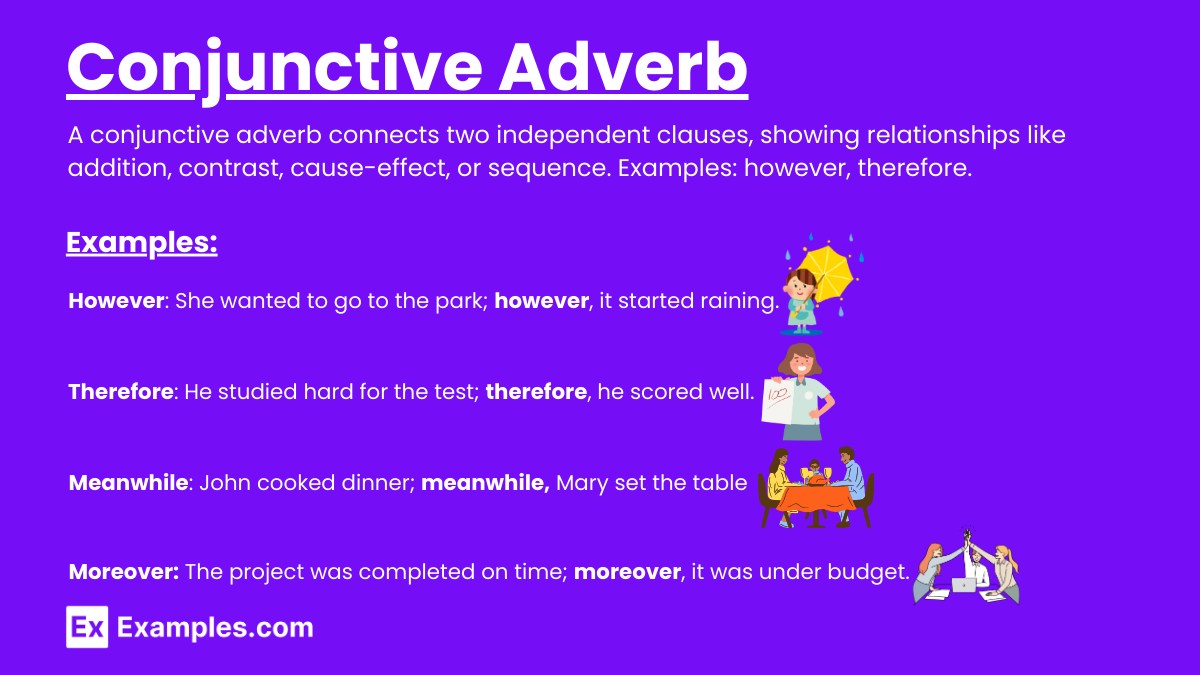
Conjunctive adverbs are essential tools in writing that help to establish logical connections between ideas, enhancing sentence coherence and flow. By providing transitions, conjunctive adverbs enable writers to connect sentences, paragraphs, and even entire sections of text smoothly. This article explores the definition of conjunctive adverbs, offers a step-by-step guide on how to use them effectively, answers frequently asked questions, and concludes with a creative reflection on their significance in diverse writing contexts.
What is a Conjunctive Adverb?
A conjunctive adverb connects independent clauses in a sentence, providing transitions and indicating relationships like cause, effect, contrast, or sequence. Examples include “however,” “therefore,” “moreover,” and “consequently.” They are typically followed by a comma when used at the beginning of a second clause.
Conjunctive Adverb Rules
Conjunctive adverbs are words that connect two independent clauses, showing the relationship between them. They often provide transitions, comparisons, contrasts, or sequences. Here are the rules for using conjunctive adverbs:
Use a Semicolon Before the Conjunctive Adverb:
Place a Comma After the Conjunctive Adverb:
When a conjunctive adverb appears at the beginning of the second clause, it should be followed by a comma.
Example: “He studied hard; therefore, he passed the exam.”
Conjunctive Adverbs within a Clause:
If a conjunctive adverb appears in the middle of a clause, it is usually surrounded by commas.
Example: “She is, nevertheless, determined to succeed.”
Beginning a Sentence with a Conjunctive Adverb:
A conjunctive adverb can start a sentence to show the relationship to the previous sentence, and it should be followed by a comma.
Example: “She didn’t enjoy the movie. Instead, she found it quite boring.”
Common Conjunctive Adverbs:
Here are some common conjunctive adverbs: however, therefore, moreover, consequently, nevertheless, furthermore, meanwhile, thus, accordingly, instead, likewise, otherwise, similarly, subsequently.
Sentence Structure Examples:
Contrast: “He is very talented; however, he lacks discipline.”
Result: “The weather was terrible; consequently, the event was postponed.”
Addition: “She is an excellent student; moreover, she volunteers regularly.”
Time: “The meeting was long; meanwhile, the team continued working.”
Avoid Run-on Sentences:
Ensure that both parts of the sentence can stand alone as independent clauses.
Example: Incorrect: “She loves to travel, however, she hates flying.”
Example: Correct: “She loves to travel; however, she hates flying.”
Common Conjunctive Adverbs and Their Functions
Conjunctive Adverb | Function | Example |
|---|---|---|
However | Contrast | “She wanted to go; however, it was too late.” |
Therefore | Result | “He was late; therefore, he missed the bus.” |
Moreover | Addition | “She is kind; moreover, she is intelligent.” |
Consequently | Result | “It rained all night; consequently, the game was canceled.” |
Nevertheless | Contrast | “He was tired; nevertheless, he finished his work.” |
Furthermore | Addition | “She is a great leader; furthermore, she inspires others.” |
Meanwhile | Time | “He was studying; meanwhile, she was watching TV.” |
Thus | Result | “He didn’t study; thus, he failed the exam.” |
Accordingly | Result | “The project was a success; accordingly, they celebrated.” |
Instead | Contrast/Alternative | “She didn’t go out; instead, she stayed home.” |
Likewise | Comparison | “He is tall; likewise, his brother is very tall.” |
Otherwise | Condition | “We need to hurry; otherwise, we’ll be late.” |
Similarly | Comparison | “She loves music; similarly, her friend is a musician.” |
Subsequently | Sequence/Time | “He won the match; subsequently, he became famous.” |
Conversely | Contrast | “He is very active; conversely, his sister is quite lazy.” |
Hence | Result | “She was ill; hence, she couldn’t attend the meeting.” |
Nonetheless | Contrast | “It was raining; nonetheless, they went for a hike.” |
Besides | Addition | “He is a good player; besides, he is a great coach.” |
Otherwise | Condition | “Complete the form; otherwise, it won’t be processed.” |
Examples of Conjunctive Adverb:
Conjunctive Adverb list
Conjunctive Adverb | Example Sentence |
|---|---|
Moreover | She is a talented singer; moreover, she plays the piano well. |
Furthermore | The project is risky; furthermore, it is expensive. |
Additionally | He enjoys painting; additionally, he loves sculpture. |
Besides | I can’t go; besides, I don’t want to. |
Also | She speaks French; also, she understands Spanish. |
However | I wanted to go; however, it was too late. |
Nevertheless | It was raining; nevertheless, we went for a walk. |
On the other hand | He is strict; on the other hand, he is fair. |
Conversely | She didn’t like the movie; conversely, he loved it. |
Yet | The task was difficult; yet, they completed it on time. |
Therefore | It was cold; therefore, we stayed inside. |
Thus | He studied hard; thus, he passed the exam. |
Consequently | She missed the bus; consequently, she was late. |
Hence | It rained heavily; hence, the match was postponed. |
Accordingly | They were warned; accordingly, they took precautions. |
Then | Finish your work; then, you can play. |
Next | We went to the park; next, we visited the museum. |
Subsequently | She graduated; subsequently, she started her career. |
Finally | We waited long; finally, the train arrived. |
Meanwhile | He was cooking; meanwhile, she set the table. |
Indeed | The book is fascinating; indeed, it’s a masterpiece. |
Certainly | She will certainly attend; she never misses a meeting. |
In fact | He is a great athlete; in fact, he won several medals. |
Undoubtedly | It is undoubtedly the best solution. |
Clearly | She was clearly upset about the news. |
Similarly | The two paintings are similarly styled. |
Likewise | He was late; likewise, she missed the bus. |
In the same way | They responded in the same way to the news. |
Comparatively | This model is comparatively cheaper. |
Equally | He is equally talented in music and sports. |
Otherwise | You must hurry; otherwise, you’ll miss the flight. |
If not | Bring your umbrella; if not, you’ll get wet. |
Provided that | You can go out, provided that you finish your homework. |
Unless | You can’t succeed unless you try. |
In that case | The meeting is canceled; in that case, I’ll work from home. |
Nonetheless | It was expensive; nonetheless, it was worth it. |
Even so | The task is hard; even so, they are determined. |
Despite this | She was tired; despite this, she continued working. |
Still | He was warned; still, he took the risk. |
Regardless | They proceeded, regardless of the danger. |
For example | Many fruits are healthy; for example, apples and oranges. |
For instance | There are many options; for instance, you could try A or B. |
Namely | Three countries, namely, Japan, China, and Korea, were visited. |
Specifically | He is interested in sports, specifically, soccer. |
In particular | She loves desserts, in particular, chocolate cake. |
In conclusion | In conclusion, we achieved all our goals. |
In summary | In summary, the event was a success. |
To sum up | To sum up, the project was a triumph. |
Overall | Overall, the experiment was successful. |
Meanwhile | She was reading; meanwhile, he was writing. |
Conjunctive Adverb Examples Sentences
Moreover, she is a talented singer; moreover, she plays the piano well.
Furthermore, the project is risky; furthermore, it is expensive.
Additionally, he enjoys painting; additionally, he loves sculpture.
Besides, I can’t go; besides, I don’t want to.
Also, she speaks French; also, she understands Spanish.
However, I wanted to go; however, it was too late.
Nevertheless, it was raining; nevertheless, we went for a walk.
On the other hand, he is strict; on the other hand, he is fair.
Conversely, she didn’t like the movie; conversely, he loved it.
Yet, the task was difficult; yet, they completed it on time.
Therefore, it was cold; therefore, we stayed inside.
Thus, he studied hard; thus, he passed the exam.
Consequently, she missed the bus; consequently, she was late.
Hence, it rained heavily; hence, the match was postponed.
Accordingly, they were warned; accordingly, they took precautions.
Then, finish your work; then, you can play.
Next, we went to the park; next, we visited the museum.
Subsequently, she graduated; subsequently, she started her career.
Finally, we waited long; finally, the train arrived.
Meanwhile, he was cooking; meanwhile, she set the table.
Indeed, the book is fascinating; indeed, it’s a masterpiece.
Certainly, she will certainly attend; she never misses a meeting.
In fact, he is a great athlete; in fact, he won several medals.
Undoubtedly, it is undoubtedly the best solution.
Clearly, she was clearly upset about the news.
Similarly, the two paintings are similarly styled.
Likewise, he was late; likewise, she missed the bus.
In the same way, they responded in the same way to the news.
Comparatively, this model is comparatively cheaper.
Equally, he is equally talented in music and sports.
Conjunctive Adverb Examples: Moreover
Conjunctive adverbs are essential in writing as they help to connect ideas and provide smooth transitions between sentences and paragraphs. One commonly used conjunctive adverb is “moreover.” It adds additional information to support the previous statement, emphasizing its significance. Below are some examples and explanations of how to use “moreover” effectively.
1. Enhancing Statements
Example: The new policy will benefit the employees. Moreover, it will increase overall productivity.
The new policy will benefit the employees. Moreover, it will increase overall productivity.
2. Adding Similar Ideas
Example: The book was insightful. Moreover, the author’s writing style was captivating.
The book was insightful. Moreover, the author’s writing style was captivating.
3. Supporting Arguments
Example: Exercise improves physical health. Moreover, it boosts mental well-being.
Exercise improves physical health. Moreover, it boosts mental well-being.
4. Providing Additional Information
Example: The conference was well-organized. Moreover, the speakers were highly knowledgeable.
The conference was well-organized. Moreover, the speakers were highly knowledgeable.
5. Emphasizing Multiple Points
Example: The project was completed on time. Moreover, it was under budget.
The project was completed on time. Moreover, it was under budget.
6. Highlighting Further Benefits
Example: Learning a new language enhances cognitive skills. Moreover, it opens up cultural opportunities.
Learning a new language enhances cognitive skills. Moreover, it opens up cultural opportunities.
7. Strengthening a Position
Example: Renewable energy sources are sustainable. Moreover, they reduce dependence on fossil fuels.
Renewable energy sources are sustainable. Moreover, they reduce dependence on fossil fuels.
8. Expanding on a Topic
Example: The film received critical acclaim. Moreover, it was a box office success.
The film received critical acclaim. Moreover, it was a box office success.
9. Linking Related Concepts
Example: She is an excellent teacher. Moreover, her dedication to her students is remarkable.
She is an excellent teacher. Moreover, her dedication to her students is remarkable.
10. Adding New Insights
Example: The study reveals significant data. Moreover, it provides a new perspective on the issue.
The study reveals significant data. Moreover, it provides a new perspective on the issue.
Conjunctive Adverb Examples: Meanwhile
Conjunctive adverbs are essential in writing as they help to connect ideas and provide smooth transitions between sentences and paragraphs. One commonly used conjunctive adverb is “meanwhile.” It indicates that two events are happening at the same time, providing a sense of simultaneous action or parallel occurrences. Below are some examples and explanations of how to use “meanwhile” effectively.
1. Concurrent Events
Example: John was cooking dinner. Meanwhile, Mary was setting the table.
John was cooking dinner. Meanwhile, Mary was setting the table.
2. Simultaneous Actions
Example: The children were playing outside. Meanwhile, their parents were discussing vacation plans.
The children were playing outside. Meanwhile, their parents were discussing vacation plans.
3. Different Locations
Example: The team was practicing on the field. Meanwhile, the coach was in a meeting.
The team was practicing on the field. Meanwhile, the coach was in a meeting.
4. Parallel Situations
Example: The store was closing for the day. Meanwhile, the online shop remained open.
The store was closing for the day. Meanwhile, the online shop remained open.
5. Ongoing Processes
Example: The software was being installed. Meanwhile, the users were reading the manual.
The software was being installed. Meanwhile, the users were reading the manual.
6. Different Activities
Example: The guests were arriving. Meanwhile, the host was preparing refreshments.
The guests were arriving. Meanwhile, the host was preparing refreshments.
7. Related Events
Example: The presentation was starting. Meanwhile, the audience was settling in their seats.
The presentation was starting. Meanwhile, the audience was settling in their seats.
8. Sequential Timing
Example: The train departed at noon. Meanwhile, passengers were boarding the next one.
The train departed at noon. Meanwhile, passengers were boarding the next one.
9. Multiple Focuses
Example: The actor was rehearsing his lines. Meanwhile, the director was arranging the set.
The actor was rehearsing his lines. Meanwhile, the director was arranging the set.
10. Varied Tasks
Example: The chef was preparing the main course. Meanwhile, the sous chef was making the dessert.
The chef was preparing the main course. Meanwhile, the sous chef was making the dessert.
Conjunctive Adverb Examples: Nevertheless
Conjunctive adverbs are essential in writing as they help to connect ideas and provide smooth transitions between sentences and paragraphs. One commonly used conjunctive adverb is “nevertheless.” It introduces a contrast or unexpected continuation, often emphasizing that despite the previous statement, something else is still true. Below are some examples and explanations of how to use “nevertheless” effectively.
1. Contrasting Statements
Example: The weather was terrible. Nevertheless, they decided to go hiking.
The weather was terrible. Nevertheless, they decided to go hiking.
2. Unexpected Outcomes
Example: He was inexperienced. Nevertheless, he managed to complete the project successfully.
He was inexperienced. Nevertheless, he managed to complete the project successfully.
3. Overcoming Obstacles
Example: She was tired. Nevertheless, she continued to work on her assignment.
She was tired. Nevertheless, she continued to work on her assignment.
4. Despite Difficulties
Example: The exam was challenging. Nevertheless, she scored the highest marks.
The exam was challenging. Nevertheless, she scored the highest marks.
5. Persistence in Adversity
Example: The team faced many setbacks. Nevertheless, they won the championship.
The team faced many setbacks. Nevertheless, they won the championship.
6. Unexpected Persistence
Example: He was not feeling well. Nevertheless, he attended the meeting.
He was not feeling well. Nevertheless, he attended the meeting.
7. Defying Expectations
Example: The book was lengthy. Nevertheless, it was an enjoyable read.
The book was lengthy. Nevertheless, it was an enjoyable read.
8. Continuing Efforts
Example: The task was difficult. Nevertheless, she refused to give up.
The task was difficult. Nevertheless, she refused to give up.
9. Unexpected Success
Example: They had limited resources. Nevertheless, the event was a success.
They had limited resources. Nevertheless, the event was a success.
10. Maintaining Focus
Example: He encountered numerous distractions. Nevertheless, he completed his work on time.
He encountered numerous distractions. Nevertheless, he completed his work on time.
Conjunctive Adverb Examples: Otherwise
Conjunctive adverbs are essential in writing as they help to connect ideas and provide smooth transitions between sentences and paragraphs. One commonly used conjunctive adverb is “otherwise.” It introduces an alternative or opposite situation, emphasizing what would happen under different circumstances. Below are some examples and explanations of how to use “otherwise” effectively.
1. Conditional Outcomes
Example: You need to submit your application by Friday. Otherwise, you won’t be considered for the job.
You need to submit your application by Friday. Otherwise, you won’t be considered for the job.
2. Alternative Actions
Example: Wear a coat. Otherwise, you’ll catch a cold.
Wear a coat. Otherwise, you’ll catch a cold.
3. Different Results
Example: Follow the instructions carefully. Otherwise, the project might fail.
Follow the instructions carefully. Otherwise, the project might fail.
4. Possible Consequences
Example: Study for the exam. Otherwise, you might not pass.
Study for the exam. Otherwise, you might not pass.
5. Avoiding Problems
Example: Make a reservation in advance. Otherwise, the restaurant might be fully booked.
Make a reservation in advance. Otherwise, the restaurant might be fully booked.
6. Ensuring Success
Example: Save your work frequently. Otherwise, you might lose important data.
Save your work frequently. Otherwise, you might lose important data.
7. Preventing Issues
Example: Check your car’s oil level regularly. Otherwise, the engine could get damaged.
Check your car’s oil level regularly. Otherwise, the engine could get damaged.
8. Necessary Precautions
Example: Lock your doors at night. Otherwise, someone might break in.
Lock your doors at night. Otherwise, someone might break in.
9. Avoiding Misunderstandings
Example: Be clear in your communication. Otherwise, people might misunderstand you.
Be clear in your communication. Otherwise, people might misunderstand you.
10. Ensuring Compliance
Example: Follow the safety guidelines. Otherwise, you could be fined.
Follow the safety guidelines. Otherwise, you could be fined.
More Conjunctive Adverb Examples & Samples:
1. Conjunctive Adverb Example
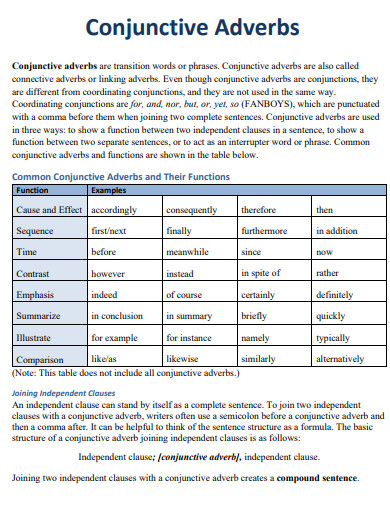
sjsu.edu
2. Sample Conjunctive Adverb
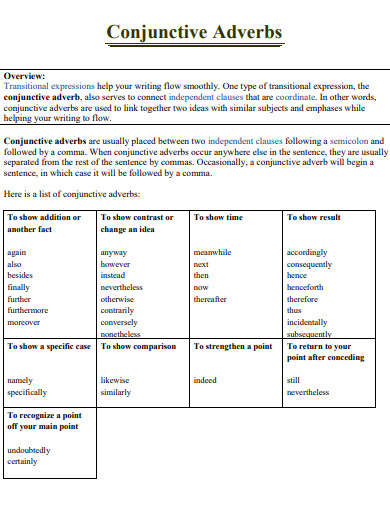
cla.csulb.edu
3. Common Conjunctive Adverb
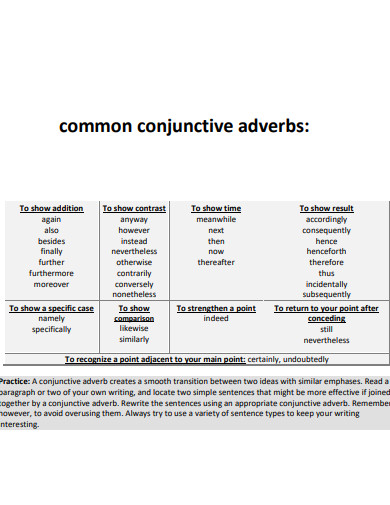
csulb.edu
4. Conjunctive Adverb in Simple Compound Sentences
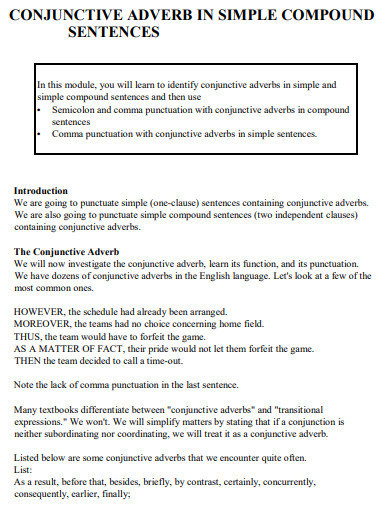
alamo.edu
5. Conjunctive Adverb Template
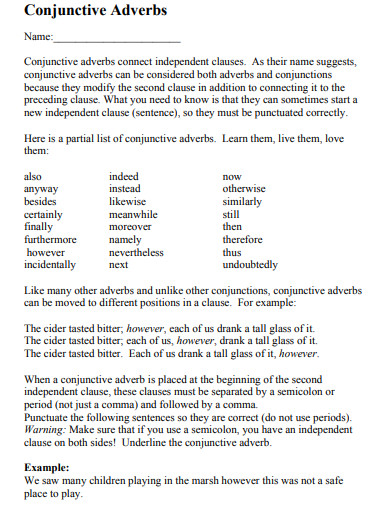
scasd.org
6. Basic Conjunctive Adverb
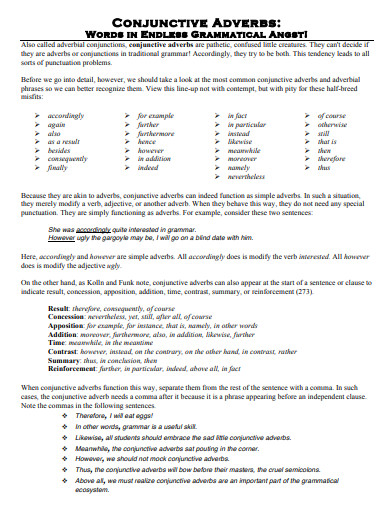
web.cn.edu
Semicolon with Conjunctive Adverb
Conjunctive adverbs help connect two independent clause, providing smooth transitions between ideas. When using conjunctive adverbs to link independent clauses, a semicolon is placed before the conjunctive adverb, and a comma follows it. Below are examples of how to use semicolons with various conjunctive adverbs, including “moreover,” “meanwhile,” “nevertheless,” and “otherwise.”
Conjunctive Adverb: Moreover
1. Enhancing Statements
Example: The new policy will benefit the employees; moreover, it will increase overall productivity.
2. Adding Similar Ideas
Example: The book was insightful; moreover, the author’s writing style was captivating.
Conjunctive Adverb: Meanwhile
1. Concurrent Events
Example: John was cooking dinner; meanwhile, Mary was setting the table.
2. Simultaneous Actions
Example: The children were playing outside; meanwhile, their parents were discussing vacation plans.
Conjunctive Adverb: Nevertheless
1. Contrasting Statements
Example: The weather was terrible; nevertheless, they decided to go hiking.
2. Unexpected Outcomes
Example: He was inexperienced; nevertheless, he managed to complete the project successfully.
Conjunctive Adverb: Otherwise
1. Conditional Outcomes
Example: You need to submit your application by Friday; otherwise, you won’t be considered for the job.
2. Alternative Actions
Example: Wear a coat; otherwise, you’ll catch a cold.
Conjunctive Adverbs vs. Subordinating Conjunctions
Conjunctive adverbs and subordinating conjunctions are both used to connect clauses, but they function differently in a sentence. Below is a table that highlights the key differences between conjunctive adverbs and subordinating conjunctions, providing clear and easy-to-understand comparisons.
Feature | Conjunctive Adverbs | Subordinating Conjunctions |
|---|---|---|
Function | Connect independent clauses | Connect independent and dependent clauses |
Examples | Moreover, however, therefore, nevertheless, meanwhile | Because, although, since, if, when |
Punctuation | Semicolon before and comma after when between clauses | No special punctuation when introducing a dependent clause |
Clause Independence | Both clauses can stand alone as sentences | Dependent clause cannot stand alone |
Placement in Sentence | Typically at the beginning of the second clause | At the beginning of the dependent clause |
Example Sentences | The project was challenging; however, we completed it. | Although the project was challenging, we completed it. |
Indicating Transition | Shows contrast, addition, cause-effect, or sequence | Indicates cause, condition, contrast, time, or reason |
How to use Conjunctive Adverbs
To harness the power of conjunctive adverbs in your writing, follow this step-by-step guide to ensure seamless transitions and improved coherence within your sentences and paragraphs.
Step 1: Identify the need for coherence:
Before incorporating conjunctive adverbs, assess your writing for areas where ideas may appear disjointed or where smoother transitions could enhance overall coherence. Look for instances where the logical connection between clauses or sentences could be strengthened.
Step 2: Choose appropriate conjunctive adverbs:
Select a conjunctive adverb that best fits the desired logical relationship between clauses or sentences. Common examples include “however,” “thus,” “therefore,” “in addition,” and “consequently.” Each conjunctive adverb serves a specific purpose in signaling the connection you wish to establish.
Step 3: Place the conjunctive adverb correctly:
Position the conjunctive adverb between two independent clauses, using a comma to separate them. Ensure that the adverb seamlessly integrates into the sentence structure, maintaining clarity and coherence.
What is a conjunctive adverb?
A conjunctive adverb connects two independent clauses, showing relationships like addition, contrast, cause-effect, or sequence. Examples include “however,” “therefore,” and “moreover.”
How do you punctuate a conjunctive adverb?
Place a semicolon before the conjunctive adverb and a comma after it when connecting two independent clauses.
Can you start a sentence with a conjunctive adverb?
Yes, you can start a sentence with a conjunctive adverb. Use a comma after the conjunctive adverb when it starts a sentence.
What are some common conjunctive adverbs?
Common conjunctive adverbs include “however,” “therefore,” “moreover,” “nevertheless,” “meanwhile,” “consequently,” “thus,” “furthermore,” “instead,” and “otherwise.”
How do conjunctive adverbs differ from subordinating conjunctions?
Conjunctive adverbs connect two independent clauses, while subordinating conjunctions connect an independent clause with a dependent clause.
Can conjunctive adverbs be used in the middle of a clause?
Yes, conjunctive adverbs can be used in the middle of a clause for emphasis or clarity, surrounded by commas.
Do conjunctive adverbs always require a semicolon?
When connecting two independent clauses, conjunctive adverbs require a semicolon before and a comma after. They don’t always need a semicolon in other uses.
Can you use multiple conjunctive adverbs in a sentence?
Yes, you can use multiple conjunctive adverbs in a sentence if they connect different ideas or clauses, ensuring clear punctuation.
Are conjunctive adverbs necessary in formal writing?
Conjunctive adverbs are useful in formal writing to clarify relationships between ideas and ensure smooth transitions between sentences and paragraphs.
How do conjunctive adverbs improve writing?
Conjunctive adverbs improve writing by creating clear connections between ideas, enhancing coherence, and making transitions between sentences and paragraphs smoother.


